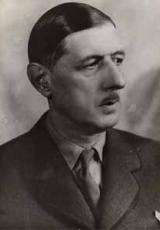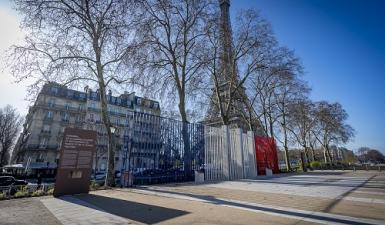1962: the end of the war in Algeria
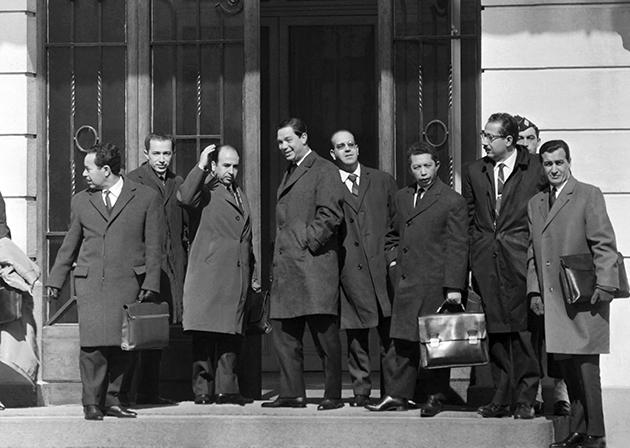
Contents
16 January: anti-OAS (Organisation Armée Secrète) demonstration in Toulouse.
24 January: OAS bombings in Paris mark the anniversary of the “Week of the Barricades”.
29 January: OAS attacks in Toulouse and Algiers (bombing of Villa Andréa, HQ of the barbouzes, in El Biar).
7 February: OAS attacks on the homes of a number of prominent figures in Paris.
8 February: Charonne metro station massacre (anti-OAS protest takes place despite government ban and is violently suppressed).
13 February: demonstration at Père-Lachaise cemetery, at the burial of the victims of the Charonne metro massacre.
7 March: negotiations between the French Government and the Provisional Government of the Algerian Republic (GPRA) are resumed in Évian.
10 March: alleged OAS attack at Issy-les-Moulineaux.
15 March: murder of six social welfare centre managers in El Biar by the OAS.
18 March: signing of the Évian Accords, granting independence to Algeria.
19 March: ceasefire in Algeria under the Évian Accords.
23 March: clash between French armed forces and the OAS in the working-class neighbourhood of Bab-el-Oued, Algiers.
25 March: arrest of OAS leader Edmond Jouhaud in Oran.
26 March: Rue d’Isly massacre in Algiers, at a peaceful demonstration of 4 000 pieds noirs in Bab-el-Oued.
7 April: arrest of Roger Degueldre, head of the Delta commandos.
8 April: 90% vote yes in referendum on the Évian Accords in France.
9 April: university shutdown in Algiers.
11 April: the OAS closes part of the port of Algiers to prevent Europeans from leaving.
13 April: General Edmond Jouhaud is sentenced to death.
14 April: prime minister Michel Debré resigns over disagreement with de Gaulle on the calling of snap elections; formation of a new government by Georges Pompidou.
20 April: OAS leader General Raoul Salan arrested in Algiers.
2 May: a terrorist attack on the port of Algiers by members of the OAS causes terror in Algeria.
10 May: murder in Algiers of seven Algerian cleaners working for European families; in retaliation, Si Azzedine, commander of the Autonomous Zone of Algiers, orders the execution of all French detainees.
19 May: mass repatriation of Europeans from Algeria begins.
23 May: General Salan is sentenced to life imprisonment.
7 June: execution of two members of the OAS, Albert Dovecar and Claude Piegts, at Fort Trou d’Enfer, in Marly-le-Roi, sentenced to death for the assassination of Algiers police chief Roger Gavoury. Algiers university library burnt down by the Delta commandos, the climax of the OAS’s scorched earth policy.
17 June: Mostefai-Susini Agreement between FLN (National Liberation Front) and OAS marks the effective end of the Algerian War.
27 June: surrender of the OAS.
1 July: in referendum on self-determination in Algeria, 99.7% vote in favour of independence.
3 July: Algerian independence officially recognised by France; transfer of sovereignty to the Provisional Executive of the Algerian State.
5 July: massacres of pieds noirs and Muslims in Oran and the Oranie region.
6 July: execution of Delta commando militant Roger Degueldre, at Fort Ivry.
17 July: first massacres of harkis by the FLN.
16 August: resumption of diplomatic relations between France and Tunisia.
22 August: attempted assassination of General de Gaulle by the OAS, in Le Petit Clamart, Paris.
28 August: signing of nine memoranda of understanding, conventions and agreements between France and Algeria, on issues such as conditions of service of French officials in Algeria, finance, the judiciary and oil exploration in the Sahara.
20 September: de Gaulle makes a televised announcement about a referendum for the election of the President of the Republic by universal suffrage on 28 October.
22 September: opening of an inquiry against Jacques Soustelle, an opponent of General de Gaulle’s proposed constitutional reform bill, for plotting against the authority of the State.
23 September: senate elections.
1 October: invoking Article 11 (referendum) to revise the Constitution deemed unconstitutional by the Council of State.
4 October: evacuation of the Bizerte naval base by the French announced for 15 October 1963.
4-5 October: the National Assembly votes a motion of no confidence against the Pompidou government, to express its rejection of the proposed reform of the method for electing the President of the Republic.
6 October: Pompidou resigns.
10 October: de Gaulle dissolves the National Assembly.
18 October: de Gaulle makes a radio and television broadcast announcing his retirement in the event of little or no acceptance of his proposal of 20 September.
19 October: Canal, Robin, Godot judgment: the Council of State annuls General de Gaulle’s order establishing the Military Court of Justice that sentenced the three to death for offences in connection with events in Algeria.
28 October: referendum on the election of the President of the Republic by universal suffrage: 62% vote yes.
18 and 25 November: Gaullist victory in the legislative elections.
28 November: death sentence of General Edmond Jouhaud commuted to life imprisonment by the President of the Republic.
7 December: formation of the second Pompidou government.
Summary
DATE: 18 March 1962
PLACE: Évian-les-Bains
OBJECT: Signing of an agreement for a ceasefire in Algeria, which also set out the terms for the transition of sovereignty from France to Algeria and included clauses laying out the broad outline of future cooperation between the two countries.
REPRESENTATIVES: The Government of the French Republic and the Provisional Government of the Algerian Republic (GPRA).
On 18 March 1962, in Évian-les-Bains, the French Government and its Algerian counterparts signed an agreement that paved the way for Algerian independence, heralding the end of 132 years of colonisation and a war that had begun in 1954. It did not lead to the immediate cessation of violence and clashes, however.
Why should the Algerian War not be remembered on the anniversary of the Évian ceasefire, on 19 March 1962? This is a question that has divided French veterans’ organisations since 19 March 1963. According to the National Federation of Veterans in Algeria and the Republican Association of Veterans, wars are remembered on the date of the ceasefire agreement that brings them to an end, as in the case of the two World Wars, remembered on 11 November (1918) and 8 May (1945). According to other organisations, however, 19 March should not be commemorated, because it did not put an end to the Algerian War but ushered in its worst period.
What was the content of the Évian Accords, signed on 18 March 1962 by representatives of the French Government and the Provisional Government of the Algerian Republic (GPRA), and how were they enforced on the ground by each side?
Putting an end to the war
The Évian Accords were the result of a long process of negotiations, initiated following the referendum of 8 January 1961, which mandated the French Government to prepare the self-determination of Algeria by creating an embryonic Algerian State. Negotiations with the GPRA lasted nearly 15 months. They were delayed by the “generals’ putsch” of 22 April 1961 in Algiers, then opened publicly in Évian on 20 May 1961, and were twice suspended, first by France in June, then by the GPRA in July. After several months of great uncertainty, the negotiation process was secretly resumed in November 1961, leading to preliminary agreements signed on 18 February 1961 in a chalet in Les Rousses, then renegotiated at Évian on 7 to 18 March 1962. During that time, French opponents to negotiations with the FLN (National Liberation Front) founded the OAS (Secret Army Organisation), the only organised force trying to prevent the agreements from being implemented by force.
The Évian Accords were, in the words of one of their French signatories, Robert Buron, “a very strange document”. Indeed, they comprised not only a ceasefire agreement between two armies, but also a procedure for the transition from French to Algerian sovereignty over a period of three to six months, as well as clauses setting out the broad outline of future cooperation between the two countries for the coming years. The Accords thus consisted of a number of documents: a bilateral ceasefire agreement, together with “government declarations concerning Algeria”, which were drawn up by common accord but published separately by the two parties.
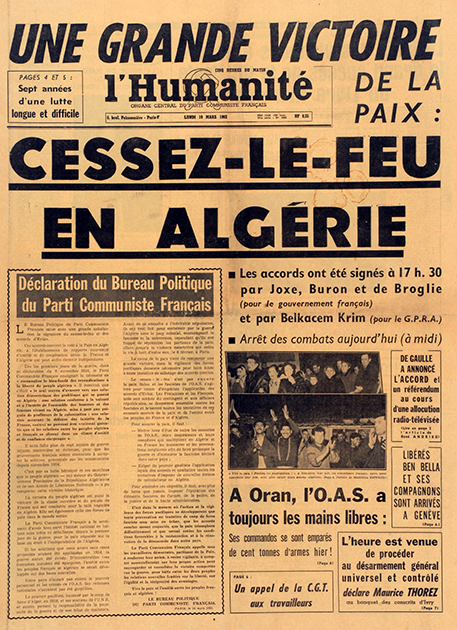
Announcement of the ceasefire in Algeria, front page of L’Humanité, 19 March 1962. . © Bianchetti/Leemage/Leemage via AFP
The general declaration summed up the key aspects of the agreements. It set out the structure of government during the transition period (coexistence of a French high commissioner, with ultimate responsibility for maintaining law and order, and a majority-Muslim, provisional Algerian executive) and the guarantees of the referendum on self-determination which would ratify the Accords and create the Algerian State within a period of three to six months. It proclaimed the full sovereignty of the future State, guaranteed the freedom and security of its population (particularly the Algerian French), and set out the principles of cooperation between the two States, the resolution of military issues and the settlement of disputes. The statement of guarantees promised total impunity to all inhabitants for acts committed prior to the ceasefire and views expressed prior to the vote on self-determination, as well as total freedom of movement between the two countries. It granted the Algerian French the right to exercise their Algerian civic rights (with representation proportional to their number) for three years before choosing their permanent nationality, and guaranteed respect for their civil rights, religion, language and property, as well as those of other French nationals with foreign status. A statement of principle established economic and financial cooperation on a contractual basis of reciprocal interests. Other declarations set out the principles of cooperation for the exploration of mineral resources in the Sahara, respecting acquired rights, by means of a Franco-Algerian technical body; cultural cooperation aimed at developing education, vocational training and scientific research, and cultural exchanges; and technical cooperation, involving French officials being sent to Algeria and Algerian trainees sent to France. A declaration on military matters determined the reduction of French forces to 80 000 men one year after self-determination, and their complete evacuation two years later, with the exception of the Mers-el-Kebir and Bou Sfer naval and air bases, which were granted concessions for 15 years, the Saharan rocket and atomic-bomb testing sites for five years, and stop-over rights at some airfields for five years. A final declaration provided for the settlement of disputes by conciliation, arbitration or appeal to the International Court of Justice at The Hague.
A chaotic implementation
On 19 March, France implemented the clauses of the Accords relating to the transition from French Algeria to Algerian Algeria, under French sovereignty embodied by High Commissioner Christian Fouchet, but in collaboration with a provisional Franco-Algerian executive appointed by common accord and presided over by former elected representative and FLN member Abderrahmane Farès. To begin with, France had to break by force the opposition of the OAS, which refused to recognise the Évian Accords in the name of the Algerian French and had sought to make them unenforceable by rejecting the ceasefire since the publication of the Les Rousses agreement. In its two strongholds, Algiers and Oran, the OAS increased its terrorist activity against the FLN, against the population of Algerian Muslims living under its authority, and against French security forces, who refused to side with it.
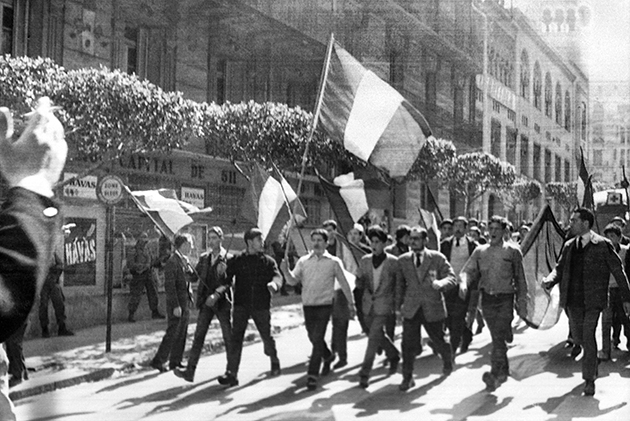
DesEuropean protesters opposed to Algerian independence march along Rue d’Isly, in Algiers, on 26 March 1962;
dozens were killed in the demonstration.
© AFP
The announcement of the ceasefire was set to unleash a decisive show of force, culminating in the brutal combing of the Bab-el-Oued neighbourhood by the French Army on 23 March, and the deaths of nearly 70 people when Algerian French Army marksmen opened fire on the crowd of French protesters on Rue d’Isly on 26 March. This was followed by a failed attempt to establish a counter-insurgency unit in the Ouarsenis region, in late March-early April 1962. The multiple arrests of OAS leaders in Algiers (first Roger Degueldre, then General Salan, nominal head of the whole organisation, on 20 April) did not halt the escalation of violence, which only ended with direct negotiations between Jean-Jacques Susin, Abderrahmane Farés, chairman of the Provisional Executive, and Chawki Mostefai, leader of the FLN delegation in that executive, culminating in a ceasefire on 17 June 1962. Meanwhile, the OAS of Oran, far better organised despite the arrest of its leader, General Jouhaud, on 25 March, continued its armed insurgency against the FLN and the French forces commanded by General Katz until late June 1962.
During this time, the FLN and its National Liberation Army (ALN) enforced the ceasefire in a very limited way. The number of French servicemen killed, wounded or abducted in Algeria after 19 March remained significant, as did the civilian victims of bombings and kidnappings. The ALN units which, according to Article 3 of the ceasefire agreement, were supposed to be “stabilised within the regions in which they currently operate(d)”, quickly moved out to extend their authority over the Algerian population, and the French Army, after attempting to oppose this by force, soon gave up.
Then, a few days after the ratification of the Évian Accords in metropolitan France by the referendum of 8 April 1962, the investiture of the Provisional Executive at Rocher Noir on 13 April and Michel Debré’s replacement by Georges Pompidou as head of the French Government on 14 April, a series of kidnappings of French civilians in Algiers, Oran and the surrounding areas began on 17 April, in what historian Jean Monneret has described as “silent terrorism”. Presented by the head of the Autonomous Zone of Algiers, Si Azzedine, as a necessary response to the anti-Algerian terrorism of the OAS, the vast majority of these kidnappings did not affect armed “killers” with the means to defend themselves: if they were targeted, it was indirectly, by causing terror among the French civilian population sheltering them, leading to a mass exodus.
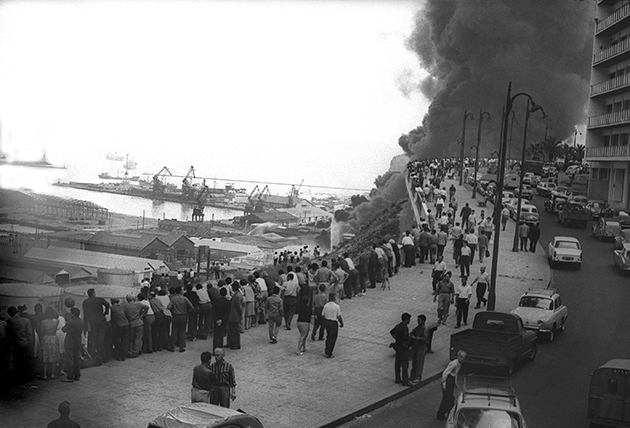
Residents of the city of Oran watch as British Petroleum storage tanks burn following an attack by the OAS Delta commandos, 25 June 1962. © STF/UPI/AFP
Nearly two months after 19 March, on 14 May the Autonomous Zone of Algiers, commanded by Si Azzedine, overtly broke the Évian ceasefire with a series of terrorist attacks across the city of Algiers, together with the execution of all hostages previously taken. General de Gaulle was at last moved to act. The decisions of 23 May of the Committee for Algerian Affairs, signed by de Gaulle, state as follows: “The High Commissioner shall intervene to ensure that the Provisional Executive succeeds in putting a stop to the kidnappings and murders of Europeans currently taking place in Algiers. It shall fall to Mr Farès, in fact, to see to it that Si Azzedine ceases his activity in this area or is detained.” In reality, Si Azzedine got what he wanted: the installation of Algerian “Temporary Occasional Auxiliaries” (ATOs), chosen by the Autonomous Zone, in the European neighbourhoods of Algiers, and the expulsion of French police and service personnel who were hostile to his cause; the French Government, meanwhile, did not obtain the GPRA’s repudiation of the kidnappings.
Paving the way for independence
Seeing that the ceasefire was no longer being respected, on 15 May General de Gaulle decided to bring forward the date of the referendum on Algerian self-determination – which had been postponed due to the chaotic situation in the country – and thus the end of the transition period, to 1 July 1962, in order to force each party to take up their responsibilities as soon as possible. He obtained a positive result in Algiers, with the ceasefire agreement negotiated between the OAS and FLN, but not in Oran.
Meanwhile, the security of “French Muslims” engaged on the French side was guaranteed in theory by the “general declaration” and the “statement of guarantees”, which stated: “No one may be subjected to police or justice measures, disciplinary sanctions or any form of discrimination as a result of: - views expressed at the time of the events that took place in Algeria prior to the self-determination vote; - acts committed at the time of those same events prior to the date of declaration of the ceasefire.” Yet on 19 March itself, a massacre of harkis took place in Saint-Denis-du-Sig (Oranie). Everywhere, promises of pardon or “redemption” to those who paid their demobilisation benefits to the ALN were followed by abductions, abuses and torture intended by their perpetrators to be exemplary. But a directive from wilaya (military region) V dated 10 April 1962, intercepted by the French Army and divulged by the OAS, fuelled fears that there was worse to come, since it told the Algerian people to await independence for a chance to take their revenge. However, on 12 May Algerian affairs minister Louis Joxe and defence minister Pierre Messmer opposed the transfer to metropolitan France of all former auxiliaries not included in the general repatriation plan drawn up by the authorities, and threatened to send all those who arrived outside that plan back to Algeria. With this, they were violating the general declaration of the Évian Accords, according to which “no Algerian may be forced to leave Algerian territory or prevented from leaving it”, and the statement of guarantees, which affirmed the “freedom of movement between Algeria and France”. Moreover, Joxe had himself assured Parliament that no French person from Algeria would lose their citizenship without renouncing it voluntarily, but that they could only exercise it in France. To turn “French Muslims” away from French soil thus amounted to depriving them of their citizens’ rights, as well as putting their lives in danger.
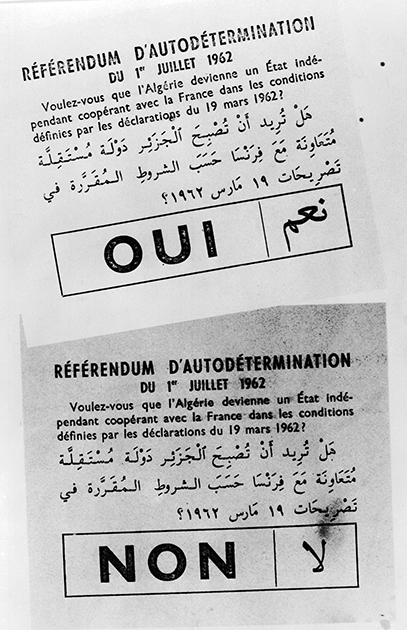
“Yes” and “No” ballot papers used in the referendum on Algerian independence on 1 July 1962. © AFP PHOTO
Instability and violence
The referendum in Algeria on 1 July 1962 should not have interrupted the process set out in the Évian Accords, since the GPRA had endorsed it, inviting the Algerian people to vote “Yes” to the question, “Do you want Algeria to become an independent State that cooperates with France according to the terms set out in the declarations of 19 March 1962?” But the National Council of the Algerian Revolution (CNRA), gathered from 25 May to 7 June, had begun by unanimously voting the “Tripoli programme”, which described them as a “neo-colonialist platform” to be dismantled as quickly as possible: it thus amounted not only to a refusal to ratify the Accords, but to a deception towards the French Government – since the Tripoli programme was kept secret – and the Algerian people, who were being called upon to ratify the Évian Accords, not knowing that they had been rejected.
The sovereignty of the French State in Algeria was transferred on 3 July to the new State embodied by the Provisional Executive, prior to the election and meeting of an Algerian constituent assembly. But its chairman, Abderrahmane Farès, immediately handed over to the GPRA the powers of the Provisional Executive, all of whose members appointed by the GPRA had resigned on 30 June in protest at the total anarchy that reigned in the country. However, president Ben Khedda refused to accept Farès’s resignation, and insisted he carry on his job despite not having the authority to do so. The Force Locale (Local Force), created under the Évian Accords to provide law enforcement for the Provisional Executive, had been placed under the command of a former Algerian officer of the French Army, but on 3 May he said he was no longer in a position to perform his role, because “his numbers were diminishing like snow in the sun, his members deserting to join the ranks of the ALN, taking their weapons and bags with them”. What remained of the Local Force had disappeared by early July 1962.
The FLN, political winner of the Algerian conflict, was divided at the time of independence into two rival coalitions that recognised either what remained of the GPRA or the Political Bureau formed by Ben Bella, an ally of the general staff of Colonel Boumedienne’s ALN. Three months of clashes interspersed with negotiations weakened the former and led to the beginnings of a civil war between wilaya 4 (the Algiers region) and the forces assembled by Colonel Boumedienne, until a ceasefire enabled the election of a national assembly, in which the people were invited to ratify the single list of FLN candidates chosen by Ben Bella, who were elected on 20 September and invested Ben Bella’s government on the 29th.
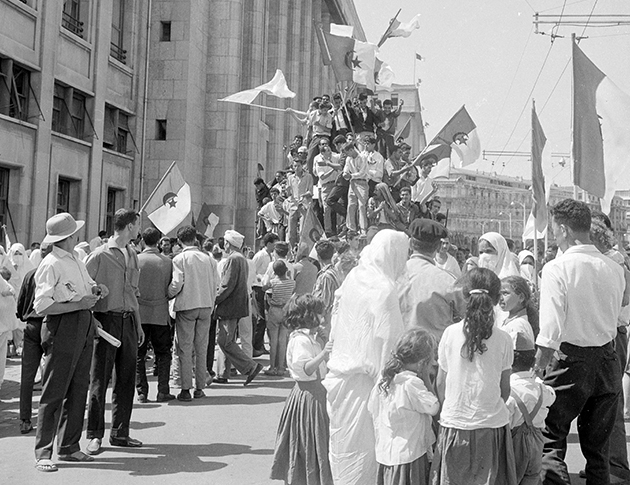
Joyous demonstrations in Algiers following the proclamation of Algerian independence on 5 July 1962. © Photographe inconnu/ECPAD/Défense
These nearly three months of anarchy favoured the continued kidnapping and murder of French civilians (and some military), especially in Oran, where nearly 700 French people were killed or abducted on 5 July 1962, the day before the arrival of France’s first ambassador to Algeria, Jean-Marcel Jeanneney. Meanwhile, violence was unleashed against the former harkis and partisans of France, in the form of abductions often followed by torture and massacres. Official statistics reported the abduction of more than 3 000 French civilians and nearly 1 700 deaths and disappearances between 19 March and 31 December 1962, but no figures are available for the number of “French Muslim” victims.
Ambassador Jeanneney endeavoured to obtain Ben Bella’s compliance with the Évian Accords, but on 8 September 1962 he found out that the previously undisclosed text of the Tripoli programme was incompatible with the Accords. After countless violations, in December 1962 the French Government imposed the end of budgetary union between the French and Algerian treasuries, which enabled the Algerian State to have France pay off its huge deficit, made worse by the mass exodus of Algerian French. But a few months later, Algeria resumed its whittling away of the Évian Accords, culminating in the nationalisation of Saharan oil and gas in 1971.
“A fragile legal construction”
Ultimately, the Évian Accords had been no more than a fragile legal construction, whereby the French Government had wanted not only to end the war with the FLN, but also to determine the future of Franco-Algerian relations, yet without acknowledging its partner as legal representative of an Algerian State yet to be created. Although the three French ministers who took part in the Évian negotiations had agreed to sign the text of the Accords and initial the 93 pages together with the head of the GPRA delegation, Belkacem Krim, the French Government did not publish it as it was, but under the title “government declarations concerning Algeria”, with a different layout and different signatures. And it protested against the de jure recognition of the GPRA by the Soviet Government on 19 March. Thus, by not recognising its negotiating partner, the French Government had itself weakened the text of the Accords. Meanwhile, the GPRA had taken a more logical stance, proposing as early as 24 October 1961 that the French Government should recognise the GPRA without delay, before negotiating the remaining matters between States, and, after 18 March 1962, publishing the main tests of the Accords as the result of negotiations between two governments.
It is therefore understandable why, for more than three decades, successive French Governments have refused to commemorate 19 March 1962. Far from putting an end to the confrontations, the very limited enforcement of the ceasefire that accompanied the Accords nevertheless enacted the end of a cycle, paving the way for an independent Algeria.
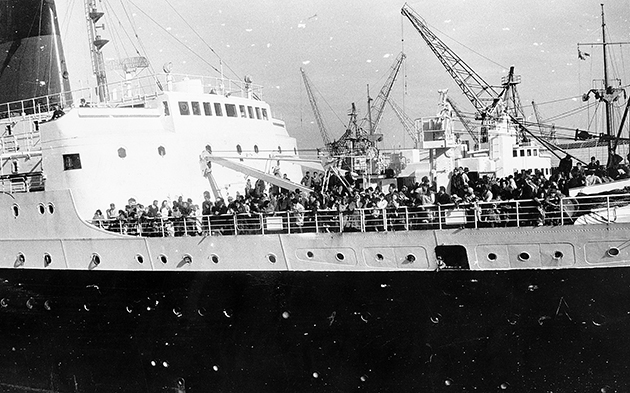
Repatriates from Algeria on board the liner Ville-d’Alger, 20 June 1962. © Jean-Jacques Jordi
Author
Guy Perrier, historian
Read more
Le 19 mars 1962, importance et limites d’une date symbolique [19 March 1962: importance and limitations of a symbolic date], a ten-minute film commissioned from the ECPAD by the DMCA.
Articles of the review
-
The event

Algeria in the ECPAD archives
Read more -
The figure

The National Office for Veterans and Victims of War
The National Office for Veterans and Victims of War (ONAC-VG) is an executive agency of the Ministry of the Armed Forces that guarantees the nation’s recognition of those who have served it. Today it is the “one-stop shop” for harkis and their families, who it supports in their applications. ...Read more -
The interview

Remembering the Algerian War
The Memorial to the Algerian War and the fighting in Morocco and Tunisia is a Major National Remembrance Site of the Ministry of the Armed Forces. The man behind it, Gérard Collin-Thiébaut, and the staff of the National Office for Veterans and Victims of War (ONAC-VG) talk about the meaning and util...Read more
Related articles
- De Gaulle and Algeria
- 1962: the French exodus from Algeria
- The harkis, from Algeria to France
- The harkis’ Algerian War
- L'engagement et le parcours des Harkis, de la guerre d'Algérie à nos jours
- The disappeared of the Algerian War
- Carte des lieux de mémoire et centres d’accueil pour Harkis et rapatriés d’Algérie


